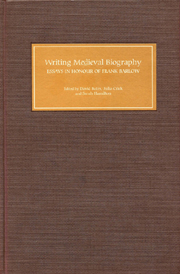Book contents
- Frontmatter
- Contents
- Preface
- List of Abbreviations
- Introduction
- 1 Did Charlemagne have a Private Life?
- 2 Bones for Historians: Putting the Body back into Biography
- 3 ‘Carriers of the Truth’: Writing the Biographies of Anglo-Saxon Female Saints
- 4 Alfred and his Biographers: Images and Imagination
- 5 Re-Reading King Æthelred the Unready
- 6 Writing the Biography of Eleventh-Century Queens
- 7 The Flemish Contribution to Biographical Writing in England in the Eleventh Century
- 8 The Conqueror's Earliest Historians and the Writing of his Biography
- 9 Secular Propaganda and Aristocratic Values: The Autobiographies of Count Fulk le Réchin of Anjou and Count William of Poitou, Duke of Aquitaine
- 10 Reading the Signs: Bernard of Clairvaux and his Miracles
- 11 Arnulf's Mentor: Geoffrey of Léves, Bishop of Chartres
- 12 The Empress Matilda as a Subject for Biography
- 13 The Gesta Stephani
- 14 Writing the Biography of Roger of Howden, King's Clerk and Chronicler
- 15 Writing a Biography in the Thirteenth Century: The Construction and Composition of the ‘History of William Marshal’
- 16 The Strange Case of the Missing Biographies: The Lives of the Plantagenet Kings of England 1154–1272
- Index
11 - Arnulf's Mentor: Geoffrey of Léves, Bishop of Chartres
Published online by Cambridge University Press: 12 September 2012
- Frontmatter
- Contents
- Preface
- List of Abbreviations
- Introduction
- 1 Did Charlemagne have a Private Life?
- 2 Bones for Historians: Putting the Body back into Biography
- 3 ‘Carriers of the Truth’: Writing the Biographies of Anglo-Saxon Female Saints
- 4 Alfred and his Biographers: Images and Imagination
- 5 Re-Reading King Æthelred the Unready
- 6 Writing the Biography of Eleventh-Century Queens
- 7 The Flemish Contribution to Biographical Writing in England in the Eleventh Century
- 8 The Conqueror's Earliest Historians and the Writing of his Biography
- 9 Secular Propaganda and Aristocratic Values: The Autobiographies of Count Fulk le Réchin of Anjou and Count William of Poitou, Duke of Aquitaine
- 10 Reading the Signs: Bernard of Clairvaux and his Miracles
- 11 Arnulf's Mentor: Geoffrey of Léves, Bishop of Chartres
- 12 The Empress Matilda as a Subject for Biography
- 13 The Gesta Stephani
- 14 Writing the Biography of Roger of Howden, King's Clerk and Chronicler
- 15 Writing a Biography in the Thirteenth Century: The Construction and Composition of the ‘History of William Marshal’
- 16 The Strange Case of the Missing Biographies: The Lives of the Plantagenet Kings of England 1154–1272
- Index
Summary
IN 1939, Professor Frank Barlow produced the first of his distinguished biographies of great figures of the central Middle Ages. As a biography as such it is short, for it constitutes part of the introduction to his edition of the letters of Bishop Arnulf of Lisieux. Like Professor Barlow's later biographies, it sets its protagonist in a broad cultural context, as well as establishing his career in church and government. As the young Arnulf spent formative years as a clerk in the household of Geoffrey of Lèves, bishop of Chartres, this chapter sets out to expand on Professor Barlow's perceptive comments as to what, in the making of Arnulf, that might have meant, by looking at Geoffrey's world, and Geoffrey's cultural context. But with Geoffrey, we confront the central theme of this volume, the problems and limitations of medieval biography, since rarely has someone of such contemporary prominence been so elusive to historians.
Geoffrey was bishop of Chartres from 1116, in succession to the formidable St Ivo, until his death in 1149. These were turbulent years in the northern French church, as ecclesiastical reform and political power struggles became inextricably mixed. From the mid 1120s to the mid 1130s, the Capetian kingdom hovered on the verge of civil war.
- Type
- Chapter
- Information
- Writing Medieval Biography, 750–1250Essays in Honour of Frank Barlow, pp. 173 - 184Publisher: Boydell & BrewerPrint publication year: 2006



